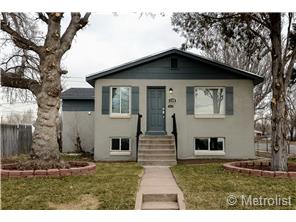 “Tracy is the best!! She sold our 1 bedroom condo in a Historic Register building in Capitol Hill in Denver. Unlike many realtors who are just looking to make a sale and move on to the next, Tracy really cares about her clients and their financial situation. She actually convinced us not to sell the first time we contacted her because the market was in the pits and our condo was worth less than 1/2 what we paid for it. By following her advice and waiting a few years, we ended up making money on the condo when it sold for OVER the asking price. She was incredibly patient with all of our concerns and questions, and knows more about the market than anyone. Also worth mentioning that we were out of state for the whole process, so she handled EVERYTHING; renovations, cleaning, staging, pricing, showing, you name it! She made this very stressful situation much less so, and we can’t imagine using anyone else.” – Keith Orell
“Tracy is the best!! She sold our 1 bedroom condo in a Historic Register building in Capitol Hill in Denver. Unlike many realtors who are just looking to make a sale and move on to the next, Tracy really cares about her clients and their financial situation. She actually convinced us not to sell the first time we contacted her because the market was in the pits and our condo was worth less than 1/2 what we paid for it. By following her advice and waiting a few years, we ended up making money on the condo when it sold for OVER the asking price. She was incredibly patient with all of our concerns and questions, and knows more about the market than anyone. Also worth mentioning that we were out of state for the whole process, so she handled EVERYTHING; renovations, cleaning, staging, pricing, showing, you name it! She made this very stressful situation much less so, and we can’t imagine using anyone else.” – Keith Orell
Hot Summer Real Estate Market Cools
Wonder why your home didn’t sell in a weekend? Here’s a bit of info on the summer real estate market. If you take a look at the graph you’ll see that showing traffic in 2Q 2016 is down quite a bit from the First Quarter of the year. This is no surprise, it’s been the seasonal trend for the last four years. Coming off of a super-heated real estate market this spring, the usual summer “slowdown” feels more dramatic than a political convention. If you’re “lingering” on the market for a whopping two weeks remember that listings don’t always sell in a weekend and not all of them get twenty offers, especially those priced over $350,000. Summer in Denver is not only the real estate selling season, it’s vacation time too! With so much to do in our lovely state, we get up, get out and go more often and our stressed out home buyers need a break. Showings tend to pick up again after the Fourth of July for those looking to make a move and settle in before school starts in late August. That’s the conventional wisdom coming from an unconventional gal.
What I have seen year-after-year is a strong autumn season for real estate sales when the summer buyers have either completed or delayed their purchase and those who want to serve Thanksgiving in a new home come out to play. Same goes for the end of the year when myth tells us it’s a bad time to list a house for sale. My experience has been that winter buyers are fewer, yes, but they are more serious and with our continued lack of inventory many will see the cooler months as a less competitive time to purchase a home. Look for more soon in my next Real Estate Market Update.
Homeownership, is it for You?
Let’s talk about homeownership. Are you considering buying vs. renting?

Renters often ask me if it’s too late to buy a house: Are we heading for a big downturn? Are we too deep in the market cycle to buy? they wonder. Timing the real estate market perfectly is extremely difficult, perhaps impossible, and some of these potential buyers were the same renters that were sitting on the fence when the market was down, even once we’d passed the nadir. I believe that buying a home is less about the market and more about life; your life. So don’t try to time the market, take a look at your life, the low interest rates and time that!
1.) Are you getting married, starting a family, or tired of paying skyrocketing rent without having an asset to show for it? Would you like to have more space; a backyard for the dog, the kids, the BBQs, or the tomatoes? Do you like the idea of being part of a neighborhood, community? Perhaps you got a nice raise, job or promotion and you’d like to set down roots, do you plan on staying in one place for at least five years? Do you like the idea of investing in something that will build long-term wealth?
These are the types of questions you should be asking when you are considering homeownership.
Here’s another thing to keep in mind. In the U.S., the average total net worth of rental households is $5,800. Compare that with the average net worth of a home-owning household at $199,500 and you’ve got worth 34 times more than those who rent! There’s no doubt that over the long term, homeownership is a solid way to build wealth and financial security. I often advise my first-time buyers to get into something affordable now (not so easy in Denver these days, but doable) and then move up when life allows. If you can keep that first property as a rental, it’s a great way to invest in your financial future.
2. Interest rates remain at record lows but this can’t last forever. No one knows when they’re going to rise, but news this week gave hints of a rise as early as June. Though home prices have gone up the past several years, low interest rates continue to make homes relatively affordable— especially compared to renting. Once interest rates rise, the door to home affordability will begin to close for a lot of potential buyers, leaving them sorry they didn’t act when interest rates were at 50-year lows.
Let me break down the numbers. Assume you are purchasing a $210,000 condo with a 5 percent down payment. The Principle + Interest payment at 4% interest would be $952 per month (tax and insurance and HOA not included). An interest rate increase of one percent (5%) would take your payment of $1,070 per month—an increase of $1,416 a year. Now assume that rates tick up to 6 percent. That increase would result in a 21 percent increase in payments from $952 to $1,196. Where you really see the effect of these increases is when you hold the property for the full 30 years. On a $210,000, 30-year fixed-rate mortgage that increases from 4 to 5 percent, the borrower who obtains the 5 percent loan would pay an additional $42,772 in extra interest as opposed to the borrower who paid just 4 percent interest. Though most buyers consider their monthly payment as most important, when you look at the life of the loan you’re paying a lot more in the total loan amount. This is a great reason to make a “move-up” move right now. Say you’ve outgrown your place, it may be time to cash out and get your “forever home”, or like I mentioned, use your current home as an income property and let your renters pay off your mortgage.
The main reason the average home owner has so much more personal wealth than the average renter is that homes appreciate in value. Over the past 45 years, homes in metro Denver appreciated 6.3 percent per year. If you buy a $200,000 home, you can expect over the long term its value to rise about 6 percent every year. This means you’d make $12,000 in appreciation the first year, an additional $12,720 the second year, another $13,483 in the third year, and on and on. Contrary to popular belief, only 4 of the past 45 years did prices actually fall in metro Denver.
If you’re still wondering whether you’d be better off renting or buying, Trulia built a great Rent-vs-Buy tool. Answer a few simple questions and the system tells you whether it makes more financial sense over the next seven years to rent or purchase. I think it’s worth a couple minutes of your time to see what you can learn – you’ll really like it! 
Key Messages for May
Prices are up 8% in the prior 12 months vs historical 6%. Inventories are tighter than last year, especially for small, lower priced homes. In 2016, we expect 8-9% appreciation, flat unit sales volume increases, and continued tight inventories.
The Zing of Zillow
Everybody loves Zillow. I love Zillow. I love how excited it gets buyers and sellers when they see a home they love or what a neighbor’s house is selling for; a useful tool in many ways, for better or worse, it empowers the consumer. I look at Zillow to see what my clients/potential clients are taking as accurate information… and then I do my homework. The #Denver #realestate market is moving so quickly that even agents and appraisers can have a hard time keeping up. Public record algorithms don’t have the ability to distinguish the differences in the quality of one property from the other, upgrades, location, or if there’s a crack house next door. Algorithms don’t call other agents to inquire about that “Coming Soon” sign or have the latest data on solds as it takes some time to record.
The Los Angeles Times recently published an article that lays it out quite clearly. Though a “Zestimate” can have a low margin of error, it can also be alarmingly high. Imagine a scenario where you’re meeting with your perspective agent thinking that your home is worth 26% more than what it will really sell for.
Sellers, armed with the Internet, often have an idea in their heads about their home’s value. When I pull comparable properties, show them what the list vs sold prices are and how many days on market it’s taken those homes to sell, they may find a different story. Sometimes the news is good, based upon my data, their home may be worth more than they think. Other times it can be a let down.
Buyers burn the midnight oil searching Zillow then send me a link to their dream home. When I hit the MLS at 7 a.m. most often I find that this dream home is under contract… or sold three months ago. If you’re looking to buy a home, I’ll send you to REColorado, the consumer website linked to the Denver Matrix MLS I use so we can work together efficiently. It’s updated throughout the day, has great home search capabilities and saves me time looking for your real home, not the one someone’s already moving in to.
All this to point out that you now have access to a lot of information about my business. A lot of it is helpful and a whole lot of fun, but none is as accurate as hiring a professional; one who specializes in finding the right home in the right neighborhood that suits your needs. If you’d like an “Exact-i-mate” about what your home might sell for in today’s Denver market, give me a call I’d be glad to sit down with you and show you your market value and why.
Is It Still a Good Time to Buy a House in Denver?
I hear the question “Is it still a good time to buy a house in Denver?” quite often, as potential home buyers wonder whether they’ve missed the market. My answer is that yes, it’s still a good time to buy a house in Denver, though it’s going to take resilience, and let me tell you why. Even though the dream of getting a screaming deal on a foreclosure got on the bus and left the depot, the strength of today’s market and home affordability show that buying a house in Denver is still a great idea.
It looked for a moment that the Denver Real Estate Market was slowing down toward the end of the summer and into fall, but what I’m seeing now, we still have a very strong market! Showing activity is high meaning that buyers are out there looking, and inventory as of January 1 was still very, very low at one month of inventory [meaning if no other homes came on the market it would only take a month to sell them ALL].
Buyers will need to be prepared to pull the trigger in this tight market; pre-qualified, well qualified and ready to present a strong offer to win in the ever-so-common bidding wars. This can mean a number of things I’d be glad to go over with you specifically. Many Buyers will conduct a home inspection solely for informational purposes without asking the Seller to repair or credit for inspection items. This relieves the Seller of the anxiety of a major or costly issue coming up and being asked to pay for it, and though the Buyer may feel similar anxiety over having to assume a house “AS-IS” they can, if done properly, still terminate the contract should the home prove unsatisfactory. Reasonable buyers, sellers and their agents would rather work out a fair negotiation than lose a good contract, even with this stipulation. Another strategy I’ve seen applied is for the buyer to offer to make up some or all of any difference between the contract purchase price and the appraised value of the home should it come in low. As bidding wars force prices up, last month’s comps may not provide the appraiser with enough information to value at contract price, or the home might have exceeded current market value. The market is moving so fast, many buyers would rather kick in some extra cash than go back out looking once they’ve found and been accepted on a home they love. Of course, you’ll have to have the cash to do this so a bit of planning might be in order if you decide to employ this.
The good news for you Buyers is that real estate still offers great wealth building potential. Using standard assumptions (5% annual appreciation), a home purchased today for $250,000 with a 10% down payment and a 4.5% interest rate can produce about $200,000 in equity in a decade! Those of you who are renting may want to think seriously about investing in yourselves. Even if you don’t have a full 10% for the down, there’s still $$$ to be made.
There are two myths in real estate that are not holding up in today’s Denver market. One is that real estate runs in seven year cycles; statistics show the last up-swing lasted for seventeen, plenty of time to build equity. The second myth is that condos are the last to rise in value and the first to tank. Right now we are seeing condominium values appreciating similarly to single homes. Overall home affordability remains attractive when you factor in interest rates, home prices and average rents (up 40% over the past five years). A very good time to buy, but before you do I advise investing in some good running shoes.
2015 Real Estate Market Review
 As the clock ticks toward year’s end, it’s time to review the 2015 real estate market.
As the clock ticks toward year’s end, it’s time to review the 2015 real estate market.
When someone asks me how the real estate market is, the cocktail party answer is that it’s been a very pleasing 12 months and future looks bright and shiny. Because the economic news is good our Denver Metro real estate market is projected to stay strong but not overheat. I’ll share some of the metrics I use to evaluate the market and understand it better, describing what 2015 looked like and where I think we’re headed.
Market strength–2015 was an extremely strong seller’s market. The market strength peaked in the spring when the bottom dropped out of our inventory and multiple offers were all the rage. Frustrating for buyers who felt they had to give away so much to stay competitive, the good news is that the market reacted appropriately and became more balanced as the year progressed. With prices on the rise, sellers were motivated to sell as we approached the fall so the market cooled with the start of school and the weather. It is still a strong seller’s market, but far more in balance. I expect 2016 to continue along this line and see no sign of a major imbalance that could lead to any sort of ugly peak and crash. Sellers should get a good price for their homes and replacement properties should not be as hard to find.
Buyers– Real estate website Trulia says that buying an average home in Denver is a whopping 38 percent cheaper than renting a home! For the average home, the interest rate would have to skyrocket to 11 percent for renting to become cheaper than buying, meaning that it is currently MUCH more affordable to buy than to rent. Even with current prices and current rents, interest rates would have to nearly triple to make renting more affordable than owning. (Call me if you want to talk about this.)
Sellers-Can’t say this enough: the most important thing to prepare your home for sale is to get rid of clutter. This includes furniture. You may have learned to live with that cherished armchair stuffed into the corner but a professional stager will often times whisk away half of your furniture. The house looks so much bigger for it, leaving space for a buyer couple and their agent to tour the home without bumping into each other, and space for their imaginations to make it their own. You don’t have to go “Stager drastic” but take a hard look, be objective, and see what you can live without. Painting always pays for itself and statistics show that springing for a staging company is often a good investment.
Rental Vacancies– The rental market is stronger than it has ever been in metro Denver. The vacancy rate for 1- to 4-unit properties is an extremely low 2 percent. That’s a drop from the already 4.7% we’d been experiencing for the past few years. On top of this, rents are rising faster than ever, up 30% in the past three years. With rents equaling a mortgage payment, we’re seeing more renters making the decision to buy. Why live waiting for another rent increase, tough competition and another application process without building any equity? Many homeowners who lost their homes in the downturn and have been renting, are becoming eligible to purchase once again. This is great news for the market and will certainly lead to more sales in 2016, though the influx of buyers insures a continuing seller’s market.
Interest rates– No one knows exactly what interest rates will do in the future but my best guess is that they may rise a little in 2016, but only a little. Remember that the Federal Reserve has control over only short-term, not long-term interest rates. Even if the Fed raises rates, that doesn’t directly affect the 30-year home buyer interest rate you are concerned with. Long-term interest rates are affected by the bond market (as bond prices decrease, interest rates increase) which, frankly, is not predictable. Understand though that interest rates are at near 50-year lows so they are highly unlikely to fall any further. All we know for sure is that someday they will go up.
The Economy– No matter what you may hear in the months leading up to the election (places hands over ears), right now the metro Denver economy is very strong. This is fueling our terrific real estate market and the rising population of our city. The unemployment rate is extremely low, about 3.5 percent. Inflation will stay in the range of 1-2 percent, our population is rising at a rate of 50,000 people/year and consumer confidence continues to rise. Nothing can be better for the housing market than a strong and steady economy.
Mortgage -The single most important number for a home buyer is their FICO score. For good or bad, your FICO plays a major role in your ability to finance your home purchase. Your credit score is a snapshot taken by the three leading credit bureaus, TransUnion, Equifax and Experian, to help lenders determine what sort of credit risk you are. Your FICO is a number between 300 and 850 and is calculated by a complex algorithm assessing your past credit history. Most home lenders will consider a score over 700 to be excellent while scores below 600 are considered poor. The better the score the more credit will be extended, at better terms, with a lower interest rate. The best credit terms are extended to consumers with scores above 740. Therefore, it’s critical to understand what your FICO is and what you can do to improve your score. When I work with buyers I help them understand the factors affecting their score so they can work to improve them. I can’t think of a better investment in your future than to spend a little time working on your FICO score.
Here are a few tips I give my clients:
1.Don’t max out your cards, try to keep them under 50% of available credit. Running high balances can severely impact your FICO.
2.Continue paying your bills on time.
3.Don’t apply for new credit or cancel an old card because length of credit helps.
4.Pay down high balances.
5.Dispute and resolve any inaccurate items in your credit report.
6.Invest in a credit monitoring company to track the changes to your score.
Denver Real Estate News May 2015
What’s new in the Denver Real Estate Market?
The question I’m asked all the time by friends, colleagues and clients who are still renting is whether it’s too late to buy a home. “Are we heading for a big downturn?” and “Are we too deep in the market cycle to buy?” they wonder. For those of you who read my newsletter and know me well the following will sound familiar but it bears repeating: timing the real estate market perfectly is extremely difficult (maybe even impossible) and those who try usually fail. So don’t try to time the market. Instead, look at factors like the ones below to see if homeownership is right for you.
1. You should buy a home when you feel it’s the right time in your life to do so. Don’t try to time the market, instead time your life. Are you getting married? Sick of paying skyrocketing rents? Looking for a bigger place for you and your family? Want your own backyard for the kids to play in? Want to be part of a neighborhood community? Plan on staying in one place for a number of years? Want to build long-term wealth? These are the types of questions you should ask yourself when considering whether you want to own a home. To the extent you say yes, home ownership might be the answer for you.
One important stat to keep in mind is that the average rental household in the U.S. has a total net worth of only $5,500. In contrast, the average homeowner has a net worth of $195,500 — that’s 36 times those who rent! Over the past 15 years, this multiple has ranged from as low as 31 times to as high as 46 times the net worth of renters. You don’t want to try to time the market, but over the long term home ownership is the tried and true path to wealth accumulation and financial security. (So is owning rental property, by the way. Call me if you’d like to learn more about that as well.)
2. Interest rates remain at record lows but this can’t last forever. No one knows when they’re going to rise (remember, you can’t time the market!), but rise they will at some point in the future. Though home prices have gone up the past several years, low interest rates continue to make homes relatively affordable (especially compared to renting). Once interest rates do rise the window of home ownership affordability will truly begin to close for a lot of potential buyers and they will be sorry they didn’t act when interest rates were at 50-year lows.
To illustrate the numbers, assume you are purchasing a $210,000 home with a 5 percent down payment. The Principle + Interest payment at 4 percent interest would be $952 per month. Just a 1 percent interest rate increase to 5 percent would result in a payment of $1,070 per month for a total increase of $128/month and $1,416/year. Now assume that rates tick up to 6 percent. That increase would result in a 21 percent increase in payments from $952 to $1,196. Where you really see the effect of these increases is when you hold the property for the full 30 years. On a $200,000, 30-year fixed-rate mortgage that increases from 4-5 percent, the borrower who obtains the 5 percent loan would pay an additional $42,772 in extra interest as opposed to the borrower who paid just 4 percent interest. That’s 21.4 percent of the total loan amount! This is why a lot of folks who don’t purchase a home while interest rates are near record lows are going to regret it down the road.
3. The main reason the average home owner has so much more personal wealth than the average condo owner is that over time, homes appreciate in value. Over the past 44 years, homes in metro Denver appreciated 6 percent per year, about 1 percent above the inflation rate. If you buy a $200,000 home, you can expect over the long term its value to rise about 6 percent every year. This means you’d make $12,000 in appreciation the first year, an additional $12,720 the second year, another $13,483 in the third year, and on and on. It’s that simple. So if you want to build wealth, your best bet may be to take advantage of these numbers and buy a home for the long term. I can help you do this. Call me and let me show you how.
This Denver loft is a corner unit with twice the windows, twice the sunshine! Spacious one bedroom, one bath loft in the Denver Ball Park neighborhood lives larger than the square footage would have you believe. Open and cheery floor plan in the main living area allows for flexible living, dining, kitchen and/or office space, yet unlike many Denver loft homes, it has a wonderful private bedroom with en suite bath. You’ll love the long, exposed brick walls, an original feature of the old Cable Building structure in the Fire Clay Lofts while an abundance of high windows bring light, character and ambient charm to this urban loft living.The L-shaped configuration of the kitchen gives you lots of room and with granite counter tops, a new stove and microwave, you may find yourself quite the host or hostess! Uniquely positioned within the building, there is no shared wall between you and another tenant, and having your own washer and dryer in the unit gives you a bit more of that detached home feeling.The Fire Clay has low HOA dues, the management is responsive, and you’ll have your own parking space in a gated lot. Come home to the Fire Clay, where
Denver loft
living and the Ball Park Neighborhood lifestyle began.Affordable Denver loft living with everything you love about the Ball Park neighborhood; proximity to downtown, Union Station, RiNo, the Millennium Bridge and Riverfront Park, Commons Park, the Platte River, Redline and other art galleries, trendy restaurants, LoDo sports bars ball parks, stadiums, theater, music and public transportation for those days you don’t want to walk or roll. (Whew!) Attractively priced at $250,000 and FHA approved, find out why you should contact me and schedule a showing today?!



![2Q16 Showing Traffic - TShaffer [4151395]-page-001 (1)](https://tracyshaffer.com/wp-content/uploads/2016/07/2Q16-Showing-Traffic-TShaffer-4151395-page-001-1.jpg)






